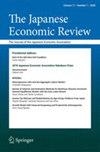潜在补偿原则与收入的恒定边际效用
IF 0.5
4区 经济学
Q2 ECONOMICS
引用次数: 2
摘要
在政策应用中,工业经济学家习惯于援引卡尔多-希克斯潜在补偿原则来证明将无谓损失作为衡量市场力量的福利成本的方法是合理的。这种用法基于两个假设。其中一个假设是,消费者剩余和生产者剩余的变化权重相等,这一点很好理解。另一种假设,即收入的边际效用是恒定的,受到的关注较少。在一个简单的模型中,我表明,如果收入的边际效用在减少,那么将无谓损失作为市场表现的指标就站不住脚了。本文章由计算机程序翻译,如有差异,请以英文原文为准。
The Potential Compensation Principle and Constant Marginal Utility of Income
In policy applications, industrial economists are wont to invoke the Kaldor–Hicks potential compensation principle to justify the use of deadweight loss as a measure of the welfare cost of market power. This usage rests on two assumptions. One of these assumptions, that changes in consumer and producer surplus are weighted equally, is well understood. The other assumption, that the marginal utility of income is constant, receives less attention. In a simple model, I show that if there is decreasing marginal utility of income, the use of deadweight loss as an index of market performance rests on shaky ground.
求助全文
通过发布文献求助,成功后即可免费获取论文全文。
去求助
来源期刊

Japanese Economic Review
ECONOMICS-
CiteScore
2.70
自引率
0.00%
发文量
15
期刊介绍:
Started in 1950 by a group of leading Japanese economists under the title The Economic Studies Quarterly, the journal became the official publication of the Japanese Economic Association in 1959. As its successor, The Japanese Economic Review has become the Japanese counterpart of The American Economic Review, publishing substantial economic analysis of the highest quality across the whole field of economics from researchers both within and outside Japan. It also welcomes innovative and thought-provoking contributions with strong relevance to real economic issues, whether political, theoretical or policy-oriented.
 求助内容:
求助内容: 应助结果提醒方式:
应助结果提醒方式:


